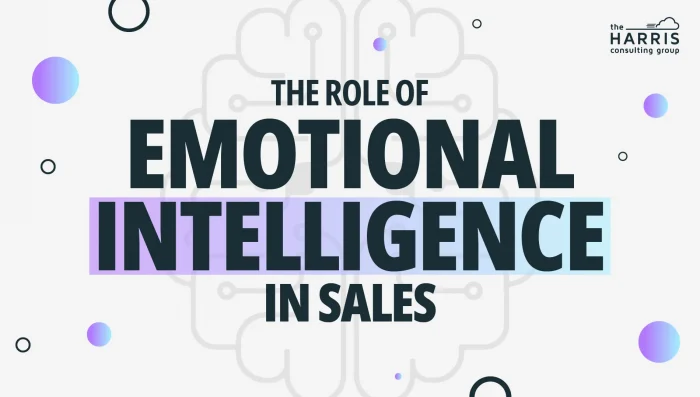Nowadays, the sales environment, the emphasis on technical knowledge, and strategic savvy are more crucial now than ever. These elements are essential for navigating the complexities of modern sales strategies and client demands. In this post we are going to share some of the top sales training, sales coaching, and consulting best practices.
However, what about emotional intelligence?
This ability isn’t just another line on a resume; it’s the cornerstone of effective salesmanship, enabling individuals to forge deeper connections and achieve more meaningful outcomes.
Emotional intelligence (EQ) embodies the capacity to recognize and manage one’s own emotions and to discern and positively influence the emotions of others. This skill set transcends mere interpersonal effectiveness; it is woven into the very fabric of the N.E.A.T. Selling™ methodology.
In essence, EQ is not just an advantageous skill. It’s fundamental to transforming all relationships including sales interactions into meaningful relationships and achieving excellence in the sales domain.
Thus, our goal in sales is to help reduce the risk people feel when making a decision. And we do this by helping our prospects and customers “fall in trust” with us. We don’t need them to fall in love with us the right way, we have to earn the right for that to happen. We must get them to fall in trust with us.
Understanding Emotional Intelligence in Sales
Emotional intelligence in sales is about leveraging empathy and self-awareness to foster genuine connections with clients. This involves more than just understanding a client’s needs and pain points. We need to get into our prospects’ and customers’ headspace to truly see and feel the things they see and feel concerning the pains they are trying to solve.
This soft skill is about actively listening, responding with empathy, and navigating the emotional landscapes of both the seller and the buyer. In other words, it’s about transforming transactions into interactions. And then, it’s about transforming interactions into meaningful conversations. This is where emotional connection becomes the bridge to mutual success.
The N.E.A.T. Selling™ Approach and EQ
The N.E.A.T. Selling™ methodology, which stands for Needs, Economic impact, Access to authority, and Timeline, inherently calls for a high degree of emotional intelligence. Let’s explore how EQ integrates into each component:
- Needs: Uncovering a client’s true needs requires deep listening and empathy. By understanding not just the surface-level requirements but the underlying emotional drivers, sales professionals can tailor their approach to resonate on a more personal level.
- Economic Impact: Discuss the economic impact of their current situation based on the needs they are seeking to solve or resolve. Additionally, a salesperson with high EQ can better align their offering with the emotional and financial outcomes desired by the client. This can be done by discussing and navigating their hopes, fears, and aspirations about a future state compared to their current state.
- Access to Authority: Gaining access to decision-makers is a nuanced process that benefits greatly from emotional intelligence. Recognizing and adapting to a client’s organization’s different emotional dynamics and political landscapes will make or break a deal.
- Timeline: Understanding the urgency behind a client’s timeline requires sensitivity to their pressures and constraints. A sales professional skilled in EQ can align their solution with the emotional tempo of the client’s decision-making process.
Developing Emotional Intelligence in Sales
Improving your emotional intelligence is a journey of continuous self-improvement and reflection. Here are actionable steps to enhance your EQ in the context of sales:
- Practice Active Listening: Focus on truly hearing what your clients are saying, including the emotions behind their words. This will help you respond more empathetically and effectively.
- Self-Reflection: Regularly assess your own emotional reactions and behaviors. Understanding your emotional triggers and responses allows you to manage them more effectively in high-stakes sales situations.
- Empathy Exercises: Put yourself in your clients’ shoes to better understand their perspective. This could involve role-playing exercises or simply imagining the emotional state and motivations of your clients.
- Seek Feedback: Ask for feedback on your interactions from colleagues, mentors, and clients themselves. This external perspective can offer valuable insights into your emotional intelligence strengths and areas for improvement.
- Continuous Learning: Invest in EQ training and resources. Books, workshops, and courses on emotional intelligence can provide strategies and tools to enhance your EQ skills.
Conclusion
Incorporating emotional intelligence into the sales process is not just a strategy—it’s a necessity. By integrating EQ with the N.E.A.T. Selling™ methodology, sales professionals can:
- elevate their interactions,
- foster deeper connections, and ultimately,
- achieve greater success.
Remember, sales is not just about meeting needs; it’s about connecting on a human level, and emotional intelligence is the key to unlocking that connection. If you need help to train your team and boost your employees’ emotional intelligence in sales, contact me here.
Yes, we can do this onsite as well as virtually for those with dispersed teams.







